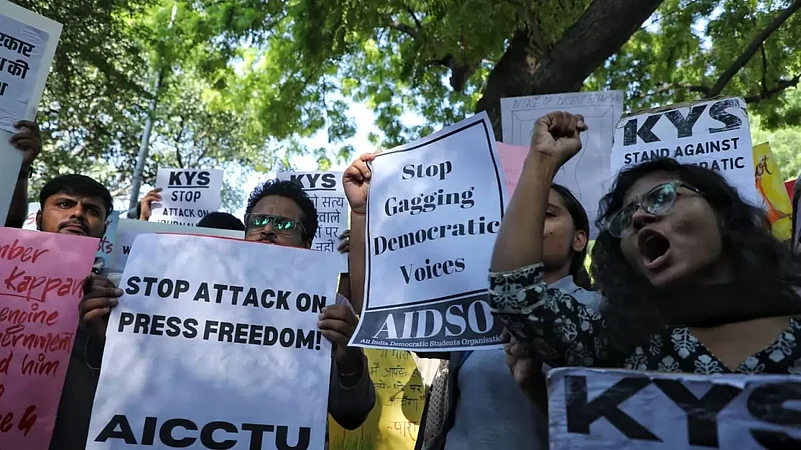Bertrand Russell in his ‘Conway Memorial Lecture,’ delivered at South Place Institute on 24 March 1922 and published later as a monograph, titled Free Thought and Official Propaganda, gave us a definition of freedom. According to him, freedom, as a concept, must define itself by identifying from what it is free. “When we speak of anything as ‘free,’ our meaning is not definite unless we can say what it is free from. Whatever or whoever is ‘free’ is not subject to some external compulsion, and to be precise we ought to say what this kind of compulsion is. Thus thought is free when it is free from certain kinds of outward control which are often present.”
Thus, any attempt at regulating thought by any external agency, according to Russell, must be seen as an obstacle to free thought. Russell also pointed out another very important feature of freedom of thought: “We may say that thought is free when it is exposed to free competitions among beliefs – i.e., when all beliefs are able to state their case, and no legal or pecuniary advantages or disadvantages attach to beliefs. This is an ideal which, for various reasons, can never be fully attained. But it is possible to approach very much nearer to it than we do at present.”
Had he been alive, Russell would have cited today's India as an ideal example to prove his point. Today's India is a country where free thought struggles to breed. Thought, in India, today, is indeed not at all free from outward control. And if you dare to express your views freely, then not only are you under constant surveillance but also in a legally disadvantageous position. You could even be behind bars – that too for years without knowing what exactly your fault is. In American academia there is a saying, "publish or perish." Our rulers seem to have tweaked it a little, "accept or perish." One is not supposed to raise even an eyebrow against what the state propagates. What the state says – even if that is utter nonsense – should be considered sacrosanct, as coming straight from the mouth of God.
It could be argued that dissenting voices are being raised by independent and daring media houses. True. But what is their number? They are only a few in comparison to the thousands that are acting as the mouthpieces of the government. This apart, the government itself has devised new machinery to continuously feed the masses its ideologies and lies. Here we can fall back upon Russell again. In his lecture, Russell underlined ‘equality of opportunities’ as a precondition for freedom of thought saying, “Equality of opportunity among opinions is essential if there is to be real freedom of thought.” He explained his stance by stating that “thought is not free if all the arguments on one side of a controversy are perpetually presented as attractively as possible, while the arguments on the other side can be discovered by diligent search.” When one reads this, it seems, Russell, as a sci-fi author, was actually writing about our own poor country, imagining what it would look like as a totalitarian state one hundred years later under a great dictator. Equality of opportunity of opinions has become an extinct species in today's India.
In a context like this, the letter written to the CJI (after the recent arrest of two journalists) by organisations, such as, the Digipub News India Foundation, Indian Women's Press Corps, and the Press Club of India seems to be a much-needed and timely intervention. Commenting on the raids on the staffers of NewsClick, the letter reads, "Subjecting journalists to a concentrated criminal process because the government disapproves of their coverage of national and international affairs is an attempt to chill the press by threat of reprisal–the very ingredient you identified as a threat to freedom." It has urged the CJI to frame guidelines for the interrogation of journalists and for seizures of their tools like phones and laptops as such operations practised at whims terribly intimidate the free-thinking individuals, compelling them to act as deaf and dumb in future.
For protecting the freedom of thought, Russell, too, felt the need for law. But then, he ultimately said, “The cure is not to be sought primarily in such laws but in better education and a more sceptical public opinion.” Who will offer a better education and foster sceptical public opinion in today's India? Without undermining the importance of individual enterprises in this regard, it has to be admitted that a lot of both the cures mentioned by Russell depend on the policy makers. If in school books, myth is accepted as history, historical events are assessed from partisan perspectives, astrology is respected as science, instead of getting bettered, education is destined to worsen. Similarly, for questioning the official propaganda of the state and expressing free thoughts, if public intellectuals are given exemplary punishments by putting them behind bars and (in worst circumstances) also killing them, processes that form sceptical public opinion are nipped in the bud.
As things stand now, despite its limitations, judiciary seems to be the last resort for the free-thinkers of this unfortunate country. CJI should act upon the letter mentioned above to prevent the country turning from a totalitarian state to a fascist one.


























